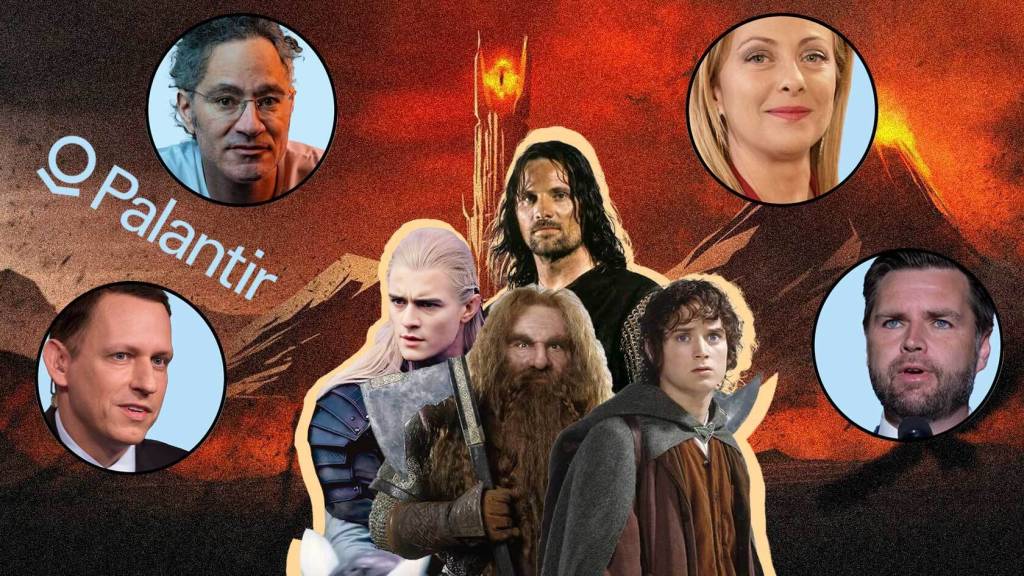What do the names Palantir, Mithril and Narya have in common? They are all objects found in J.R.R. Tolkien’s The Lord of the Rings (LotR). They are also the names of companies founded by people loosely affiliated with the tech-right.
Think libertarian billionaire and early Trump supporter Peter Thiel, who runs Mithril Capital Management LLC, and US Vice President JD Vance, who runs Narya Capital.
There is also Anduril Industries Inc., a defence company named after a sword in the books, and Erebor Bank, which caters to cryptocurrency and AI customers and bears the name of the mountain in which the dragon Smaug guards his treasure in The Hobbit. Anduril was founded by Palmer Luckey, the creator of the Oculus Rift, one of the world’s first consumer virtual reality headsets. Erebor was founded by Luckey and Palantir Technologies Inc. cofounder Joe Lonsdale.
Related Article Block Placeholder
Article ID: 1213282
Perhaps most notoriously, Palantir is the name for seeing eye stones in Middle-earth used by powerful beings to communicate with each other — often to their own detriment. Palantir Technologies Inc. is a software company founded by Thiel in 2003, which has faced criticism for its role in expanding government surveillance through artificial intelligence and facial recognition software. It has recently been the target of protests for its involvement in building deportation software for the Trump administration.
“There’s a very long association of LotR with conservative politics,” says Dr Helen Young, senior research fellow in the Writing, Literature and Culture Group in the School of Communication and Creative Arts at Deakin University. “Tolkien himself was reasonably conservative for his time, [and] his fantasy world of Middle-earth is a kind of racist fantasy.”
Young says Tolkien’s world is one where biological race is real, and the different white-coded protagonist races (humans, elves, dwarves and hobbits) face off against orcs and other creatures who are described as black-skinned with “slant eyes”.
It should be noted that Tolkien denounced the Nazis and apartheid, among other social injustices.
Published in the mid-1950s, LotR initially found success among the left-wing environmental movement, drawn to its themes of simple-living Hobbits standing in opposition to the forces of evil and industry. In the ’70s, however, the book was picked up by the right.
Giorgia Meloni, before she became the right-wing prime minister of Italy, said, “Tolkien could say better than us what conservatives believe in … I don’t consider Lord of the Rings fantasy.” These sentiments were echoed by Vance, who recently remarked that a lot of his conservative worldview was “influenced by Tolkien”.
The backlash Amazon’s recent LotR prequel series The Rings of Power received for casting actors of colour in roles typically reserved for white actors shows how commonplace these views are. Conservative political commentator Matt Walsh said, “Because I am a fan of LotR, I will not watch the Amazon version.”
Thiel, who has launched at least five companies with names taken from LotR, has lamented that today’s scientists have given up on a search for immortality — a fascination stemming from Tolkien’s version of elves. Thiel has also suggested society’s perceived lack of recent technological progress could be due to the emergence of the Antichrist, using Swedish climate activist Greta Thunberg as a stand-in figure.
The idea of the Antichrist could resonate with certain fans of LotR, where notions of good and evil take on real, cosmological forces, says Young, adding that its main antagonist Sauron is a physical manifestation of evil — a purely corrupting force.
“[The right-wing] present themselves as returning freedom,” she says, “being the ones who are taking on a heroic role and returning freedom to these people who have been oppressed by the ‘authoritarian rule’ of ‘wokeness’.”
Related Article Block Placeholder
Article ID: 1012903
These naming conventions rely on a shallow reading of Tolkien’s work, says Dr Nick Groom, professor of literature in English at the University of Macau.
In LotR, the Palantir stones allowed users to communicate vast distances, often to their peril. Erebor was a mountain holding vast amounts of wealth, but was invaded by a dragon that killed all its inhabitants. Anduril, also known as “the Flame of the West”, was a great sword, but one that had to be reforged after shattering in failing to defeat Suaron thousands of years prior.
“These are very difficult, tricky, even unreliable objects,” says Groom. “I would never name a company Palantir. You’ve actually missed the point of Tolkien saying this is fundamentally unreliable technology.”
In the case of Palantir at least, the founders seem to be in on the joke. In 2020, Lonsdale said they named the company after the “cautionary tale” of seeing stones that fall into the wrong hands.
“There’s a very intentional branding psychology at play here — and it’s more than just fandom,” says Grigory Frolov, digital marketing specialist at Oz Web Expert. “These [names] suggest inevitability, control, and visionary leadership — a strong appeal for founders who position themselves as disruptors or defenders of ‘the West’.”
Both Groom and Young caution against overly simplistic readings of Tolkien’s texts, which are vast and often contain unresolved contradictions.
“It’s not a matter of saying, ‘[Tolkien] was a racist… and that’s all you can get out of them’,” Young says. “That’s not the case, but it’s the kind of control over what ideological readings you can have of those books, and that world is part of, that is the question. Why name these companies after those things?”
Are these company names inspired or idiotic?
We want to hear from you. Write to us at letters@crikey.com.au to be published in Crikey. Please include your full name. We reserve the right to edit for length and clarity.



